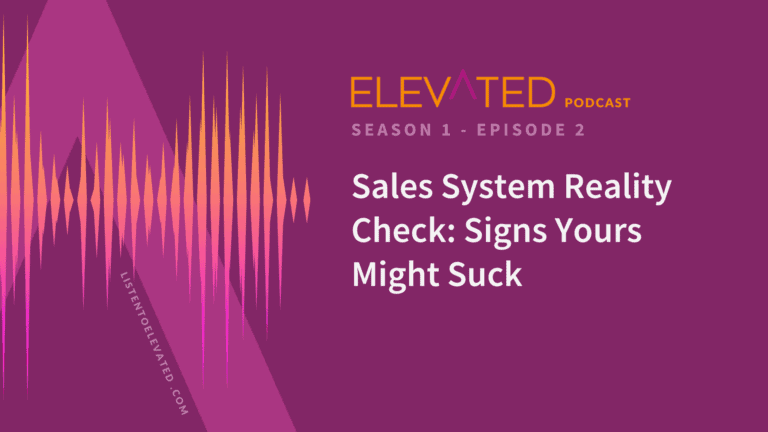Sales System Reality Check: Signs Yours Might Suck

Sometimes it is hard to know that something could be better when we’ve only known the way it is. Add to that the human condition of being change-resistant, the devil you know and all that, we just keep grinding away being completely unaware that there is any other option.
Sales systems tend to be one of those places in the business that get developed out of necessity in the beginning and are pretty much used without question unless something really goes south, or an outside perspective happens in.
Revitalizing Your Kitchen & Bath Sales System: Unmasking Improvement Opportunities
This episode is to help you identify if your sales system could benefit from improvement. There are some “usual suspects” that are indicators that you, your business and your sales people would benefit from changes in the way you are handling sales in your Kitchen & Bath design business.
Having a useful and intentional sales system in place allows you to maintain full oversight of all stages of your sales process, from the initial client interaction to the closing of a sale. This level of transparency provides an opportunity to identify potential roadblocks or lagging phases in the process so that improvements can be made quickly and efficiently.
Harnessing Predictability: The Power of a Robust Sales System
Predictability is another significant advantage of implementing a strong sales system. By accurately tracking and analyzing the number and quality of leads over time, it becomes easier to forecast sales and financial outcomes. Knowing how many leads typically convert to sales and the average time it takes for this to occur allows for more accurate business planning and task scheduling.
Understanding and assessing lead quality is crucial to using your marketing dollars wisely. Your sales system can provide clear parameters and tools to evaluate the quality of your leads. This can be incredibly useful in improving your marketing efforts, targeting the most fruitful lead sources, and ultimately increasing the efficiency of your sales funnel.
Building Client Trust and Efficiency
An efficient sales system also fosters confidence in client communications and deadlines. With all vital data and client interactions visible to the entire team, you build trust with your clients, meeting their demands effectively, and delivering on timelines. With this level of transparency, it also minimizes miscommunication within your team and enhances project management and coordination. A strong sales system is instrumental in optimizing operations, improving productivity, and driving business growth.
Spotting Weak Links: 4 Signs Your Sales System Needs an Overhaul
Okay, you get it – your sales system may benefit from improvements. Let’s cover 4 signs that your current sales system might suck:
- You don’t know the number or source of all your leads. If there isn’t a clearly defined system to effectively track leads you are likely in the dark about how many leads you have, which ones are good and when they were last contacted. Without a lead tracking system, not only are you likely missing out on potential sales, you can’t get a handle on what it would take to grow your business.
- Information about leads is in many different places. If there isn’t 1 place to store lead information, or if there isn’t integration between different platforms used in the sales process – from an initial inquiry, through to designing, quoting, and ordering, this can create a lot of unnecessary work and lead to mistakes.
- There isn’t a Client Relationship Management (CRM) System. There might not yet be a systematic approach to client relationship management. This doesn’t necessarily have to be a software system, but it is the most effective way to organize client information, track interactions, and profile prospective and existing clients.
- You don’t have any way to track everything that happens before the sale. A good sales system allows you to track performance metrics that lend insight into what’s working and what’s not. There are many touchpoints, interactions and decision-points before a client decides to give you money. It is almost impossible to monitor and optimize sales performance without this information.
Empowering Change: Assessing and Prioritizing Process Upgrades
Determining if your current sales system has any of the signs of sucking enables you to gain better insight into what is possible, and then decide if you want to make changes or improvements. It can also help you prioritize what changes are most important to the business now, and what improvements are wanted, but can be tackled in the future.
In the next episode we’ll get slightly high-level and discuss the parts of the sales system, breaking down lead phases. This shared definition and vocabulary will power our discussions in future episodes when we talk about tracking leads and evaluating lead quality.
Heads up – High-er Help, my book on how to use experts to shortcut improvement, growth & capacity is launching October 23! Be the first to get the details on High-er Help and pre-order by going to higherhelpbook.com.
If you enjoyed this episode, you can head over to listentoelevated.com to subscribe, leave us a review or share with a friend. Everyone deserves to have less stress and more impact!

